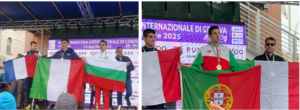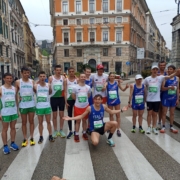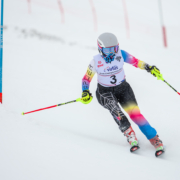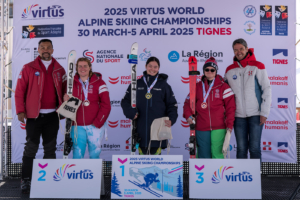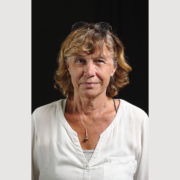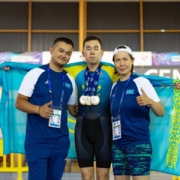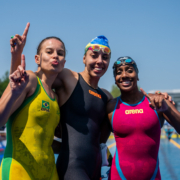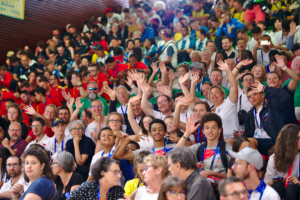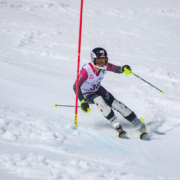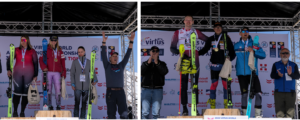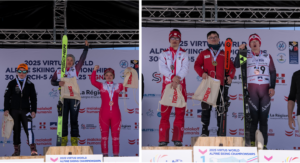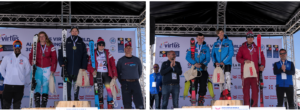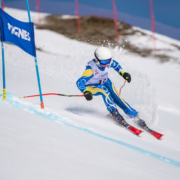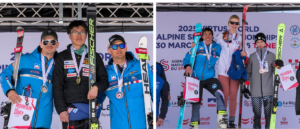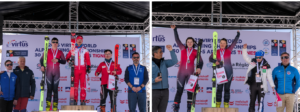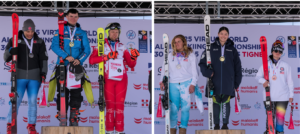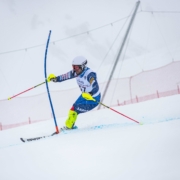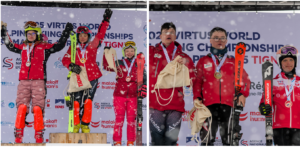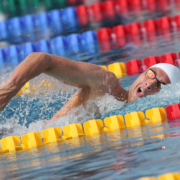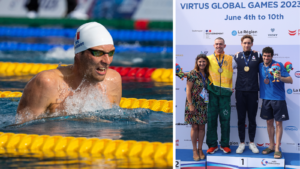April marks Autism Awareness Month, a time to celebrate the achievements of individuals with autism and advocate for greater inclusivity in sports. Virtus introduced the II3 competition class as a full medal event at the Virtus Global Games in 2023, creating a dedicated space for athletes with autism for the first time ever in the world of sports. With over 250 registered athletes, these individuals are inspiring other people with autism both nationally and internationally while supporting the UN Sustainable Development Goals (SDGs).
One such inspiring athlete is Dastan Ordabay, a talented athlete from Astana, Kazakhstan, whose journey in sports has not only brought personal success but has also paved the way for greater awareness and acceptance of athletes with autism worldwide.
Dastan comes from a big and loving family, including his mother, father, sister, brother, and grandmother. Among them, his mother has been his biggest supporter, always encouraging him to pursue his dreams.
Dastan’s autism diagnosis was a turning point for his family. However, rather than seeing it as a challenge, they embraced it as a way to grow closer together.
“Dastan’s diagnosis changed the life of our family, changed our environment. Not in a negative sense, but vice versa. We rallied as a family around Dastan, and his interests, and became an even happier family,” says his mother.
Introduced to sports at a young age, Dastan discovered his passion for cycling at just 10 years old. The thrill of ‘speed‘ drew him to the sport, and his dedication led him to competitive success. However, one of the biggest challenges he faced in training was not physical but social—understanding and communicating with coaches and teammates.
“The most difficult thing is the ability to communicate with people and understand what they expect from me,” he explains.
Despite these challenges, Dastan has found acceptance and support in his inclusive school, where his classmates and teachers embrace him for who he is.
The 2023 Virtus Global Games (GG2023) marked a historic moment for Dastan and Kazakhstan. It was the first-ever elite medal event for athletes with autism, and competing among fellow athletes with autism was a moment of pride for him.
“I was lucky that in 2023 I got to an international competition, and also came to know about Virtus Global Games too! That was our first competition outside of Kazakhstan. Of course, I was very happy. I love winning and gaining medals. I like to participate in competitions. Moreover, I prepared a lot for this competition. I wanted to get a medal, but I did not expect to win a silver. My family was very happy.”
Dastan’s victory at GG2023 was historical—at the age of sixteen, he won the first-ever medal for Kazakhstan in the II3 category. His triumph was not just a personal achievement but a source of inspiration for many families in Kazakhstan. He won four silvers from Individual pursuit 4000m, 1000m Time Trial, Individual Sprint 200 and Classment H-II3.
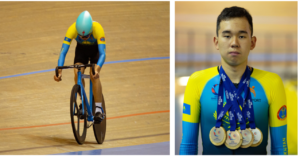
“Dastan’s victory at the GG2023 games inspired many other parents of children with autism and gave them hope, since sports for people with intellectual impairment are not so developed in Kazakhstan. This victory drew the attention of the state to the development of sports for people with mental disabilities,” shares his mother.
Dastan later won gold in II3 men’s 18.8km time trial and 5.5 km time trial in 2024 Virtus World Cycling Series in Ballarat, Australia.
Dastan’s journey in sports is far from over. While his primary focus has been cycling, he has also developed an interest in athletics and continues to train rigorously.
“Now Dastan is interested in athletics and, in my opinion, he is doing well. And of course, Dastan is preparing to participate in the GG2027 games in Cairo. He is constantly and persistently training, and time will tell in which sport.”
Virtus has played a pivotal role in supporting Dastan’s sporting journey, providing him with a platform to compete among athletes who share similar experiences.
“It’s great to be part of the Virtus family, to be among people like Dastan. The games that Virtus organizes give meaning to Dastan’s life, making it brighter and more meaningful. I think that he doesn’t think about the ultimate goal of his life, he lives here and now, and now he wants to be the first,” says his mother.
As Dastan continues to break barriers and inspire others, his ultimate message remains simple yet powerful:
“To be happy, healthy, and to win.”
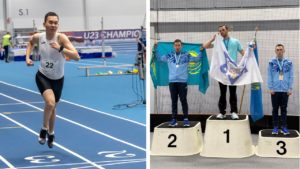
Dantan at Espoo 2025. Photo Credit: IDSport
Dastan has now set his eyes on para-athletics with a big challenge and dream of competing at the Para-Asian Games and Paralympic Games, representing his country for the first time from Central Asia. Dastan recently won three silvers in 60m-200m-800m, and gold in the long jump at the 2025 Virtus Open European Athletics Championships, Espoo.
Dastan’s story is a testament to the limitless potential of athletes with autism. His dedication, resilience, and love for competition continue to prove that with support, opportunity, and determination, anything is possible. As we celebrate Autism Awareness Month, let us champion inclusivity in sports and ensure that every athlete, regardless of their abilities, has the chance to shine.
